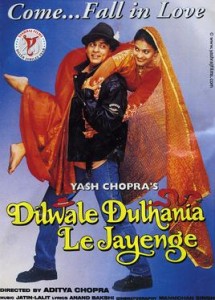 An idea that came about from the recent buzz around Dilwale Dulhania Le Jayenge’s 1000 week completion at the Maratha Mandir (and inspired by this Roja review on Milliblog) – to review DDLJ’s soundtrack like it were a newly released soundtrack.
An idea that came about from the recent buzz around Dilwale Dulhania Le Jayenge’s 1000 week completion at the Maratha Mandir (and inspired by this Roja review on Milliblog) – to review DDLJ’s soundtrack like it were a newly released soundtrack.
The soundtrack starts off with Lata Mangeshkar’s Mere Khwaabon Mein, even at the age of 65 presenting a convincingly spirited rendition of a teenage girl’s fantasies. A song that is very much identifiable as belonging to the Yash Raj stable while featuring some neat use of strings and trumpets from composers Jatin Lalit. Lata is joined by Udit Narayan and a horde of backing singers in her second song, an all-out celebratory piece titled Mehendi Lagaake Rakhna. In this case the age aspect is rather evident in the singer’s voice, though it is largely mitigated by the other singers (especially the chorus) and the general folk-based liveliness of the composition. The song scores big time in its interludes; both of which are structured quite similarly – a short mandolin solo leading into a sudden burst of percussion. In Ghar Aaja Pardesi however, the folksy base doesn’t produce the desired effect. The tune is heard-before, the arrangement is uninspiring for most part and the singing by Manpreet Kaur and Pamela Chopra isn’t exactly top-drawer either.
Given his recent success rate (the man won a record fifth consecutive Filmfare this year) and the fact that the previous two SRK-Jatin Lalit movies have had him on most songs, it is surprising that Kumar Sanu sings just one song in this movie. His duet with Lata Mangeshkar, Tujhe Dekha, however, happens to be one of the top songs of the soundtrack. Composers get the melody bang on in this one, and the vocals are fab – once again lovely use of the chorus. Barring that opening Na Jaane Mere segment, Ho Gaya Hai Tujhko derives a lot of its sound from Tujhe Dekha, it even features a mandolin version of the opening lines (which sounds lovely by the way). The derivative sound invariably leads to a mental comparison between the two songs, and Tujhe Dekha is the clear winner. Anand Bakshi’s playful, conversational lines in Zara Sa Jhoom Loon are delivered to a tee by Asha Bhonsle and Abhijeet Bhattacharya – even the apparent role reversal in the latter half of the song is very well done. And finally my favourite of the soundtrack – Ruk Ja O Dil Deewaane – a song so full of life it makes me happy every time I hear it. The arrangement is top notch here; there are obvious nods at RD Burman (that spoon-tinkling in particular) and some wonderful use of guitars and brass. Udit Narayan’s singing sits well atop all this, he manages to convey the same level of energy in his singing too.
Dilwale Dulhania Le Jaayenge. Composers Jatin Lalit’s first venture with Yash Raj, arguably their biggest project yet, and they produce their best soundtrack so far.
Music Aloud Rating: 8.5/10
Top Recos: Ruk Ja O Dil Deewane, Tujhe Dekha Toh Yeh Jaana, Zara Sa Jhoom Loon
1995 was in fact one of the better musical years from the 90s for Bollywood, in that multiple composers produced some quality work that year. Anu Malik had Akele Hum Akele Tum, Nadeem Shraavan had Raja and Barsaat, Rajesh Roshan had Karan Arjun, even MM Kreem aka Keeravani had that one song from Criminal, Tum Mile, which for a long time was his most popular song in Hindi. It was also the year that Hindi music witnessed one of the most iconic composer debuts – Rangeela. That and the dubbed version of Bombay earlier the same year meant that 1995, to me, belonged to A R Rahman.



